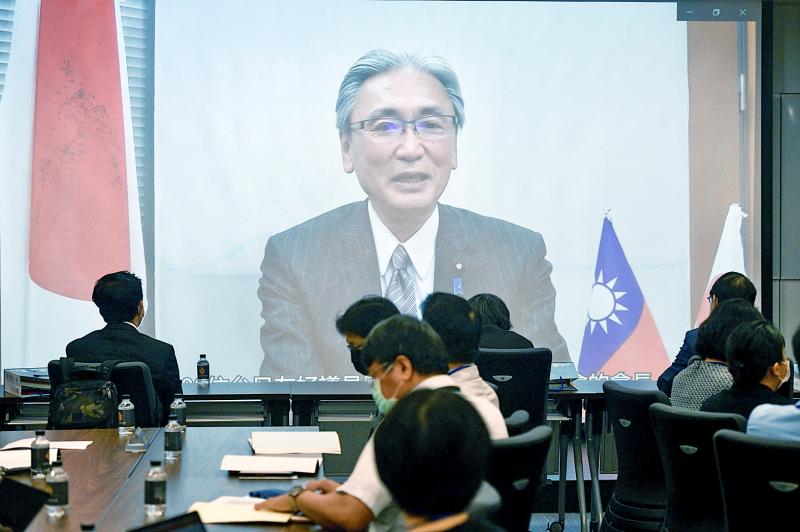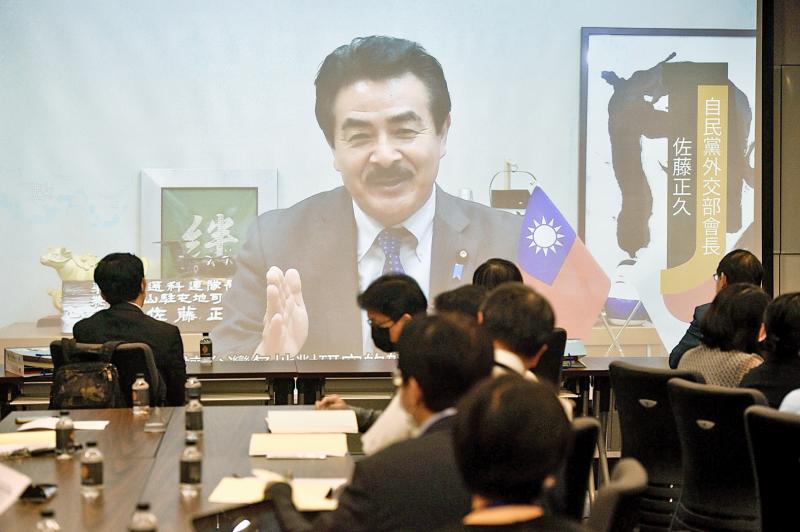Countries in the Asia-Pacific region are increasingly being threatened by China, and like-minded nations should work together to resist such threats, Japanese politicians said.
Japanese House of Representatives members Keiji Furuya and Masahisa Sato made the comments in a video played on Friday at a conference held by the Taiwan Japan Academy in Taipei.
Furuya praised President Tsai Ing-wen’s (蔡英文) administration for its efforts in reinforcing exchanges with countries in Southeast Asia and South Asia through the New Southbound Policy.

Photo: George Tsorng, Taipei Times
Taiwan also has interests in the Pacific Islands region, but they have come under threat from China in the past few years, he said, adding that the issue was discussed at this year’s Pacific Islands Leaders Meeting, which was held online in July.
PALM is a gathering of the Japanese government and leaders of Pacific island nations, held once every three years.
Taiwan’s successes in dealing with the COVID-19 pandemic could serve as a model for other countries, he said, adding that countries that share values with Taiwan and Japan should cooperate to safeguard peace and the international order.

Photo: George Tsorng, Taipei Times
Sato, a Liberal Democratic Party member, said the party had recently formed a committee to discuss Taiwan-related government policies, and offer suggestions to the Japanese administration.
The party is seeking to improve ties with Taiwan, he said.
Yasuhiro Matsuda, a professor of international politics at the University of Tokyo, told the online meeting that Japanese politicians cannot easily be classified as favorable toward China, or either of Taiwan’s major political parties.
Making such distinctions when discussing Japanese politicians is common among Taiwanese, but Japanese politicians do not align themselves in such a way, he said.
Taiwanese discourse on Japanese politics also often mistakenly compares Japan with the US, glosses over Japan’s diplomatic ties with China and lack of such ties with Taiwan, and mistakenly assumes that Japanese politics are rigidly set in place, he said.
“Taiwanese are not alone in applying labels to people like this, but the issue is particularly apparent in Taiwan. Taiwanese discourse labels people ‘pro-China,’ ‘pro-this party’ or ‘pro-that party,’” he said. “Taiwanese apply these labels to politicians from all over the world as a way to simplify discussion.”
Taiwanese tend to say that someone who emphasizes Japan-China relations is “pro-China,” someone who meets with Tsai is “pro the Democratic Progressive Party (DPP),” and someone who meets with former president Ma Ying-jeou (馬英九) is “pro the Chinese Nationalist Party,” he said.
“Yet, it is possible that the same Japanese politician is all three,” he said. “Japanese officials and academics cannot be labeled like that. They tend to just act based on personal experience and the current political climate.”

POSITIVE DEVELOPMENT: Japan and the US are expected to hold in-depth discussions on Taiwan-related issues during the meeting next month, Japanese sources said The holding of a Japan-US leaders’ meeting ahead of US President Donald Trump’s visit to China is positive news for Taiwan, former Japan-Taiwan Exchange Association representative Hiroyasu Izumi said yesterday. After the Liberal Democratic Party’s landslide victory in Japan’s House of Representatives election, Japanese Prime Minister Sanae Takaichi is scheduled to visit the US next month, where she is to meet with Trump ahead of the US president’s planned visit to China from March 31 to April 2 for a meeting with Chinese President Xi Jinping (習近平). Japan and the US are expected to hold in-depth discussions on Taiwan-related issues during the

‘LIKE-MINDED PARTNER’: Tako van Popta said it would be inappropriate to delay signing the deal with Taiwan because of China, adding he would promote the issue Canadian senators have stressed Taiwan’s importance for international trade and expressed enthusiasm for ensuring the Taiwan-Canada trade cooperation framework agreement is implemented this year. Representative to Canada Harry Tseng (曾厚仁) in an interview with the Central News Agency (CNA) said he was increasingly uneasy about Ottawa’s delays in signing the agreement, especially as Ottawa has warmed toward Beijing. There are “no negotiations left. Not only [is it] initialed, we have three versions of the text ready: English, French and Mandarin,” Tseng said. “That tells you how close we are to the final signature.” Tseng said that he hoped Canadian Prime Minister Mark Carney

President William Lai (賴清德) yesterday bestowed one of Taiwan’s highest honors on Saint Vincent and the Grenadines (SVG) Ambassador Andrea Clare Bowman in recognition of her contributions to bilateral ties. “By conferring the Order of Brilliant Star with Grand Cordon on Ambassador Bowman today, I want to sincerely thank her, on behalf of the Taiwanese people, for her outstanding contribution to deepening diplomatic ties between Taiwan and SVG,” Lai said at a ceremony held at the Presidential Office in Taipei. He noted that Bowman became SVG’s first ambassador to Taiwan in 2019 and

A man walks past elementary school artworks at the Taipei Lantern Festival in Ximen District yesterday, the first day of the event. The festival is to run from 5pm to 10pm through March 15.